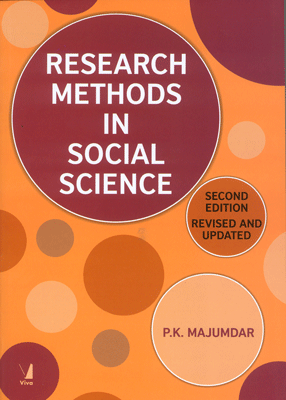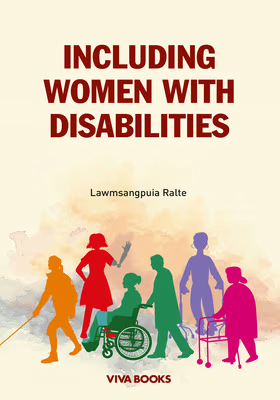Research Methods in Social Science, 2/e Revised and Updated
Research Methods in Social Science, 2/e Revised and Updated
₹985.50 ₹1,095.00 Save: ₹109.50 (10%)
Go to cartISBN: 9788130931692
Bind: Paperback
Year: 2020
Pages: 512
Size: 172 x 242 mm
Publisher: Viva Books Originals
Sales Territory: Worldwide
Description:
Research Methods in Social Science is an essential companion for all undergraduate and postgraduate students embarking on a methods course or social research project. The second edition features two new chapters as annexures: one for students of history, the other for students of biological sciences. The first chapter now includes an introduction to a very brief history of the development of modern science, including social science. This book gives a cogent exposition of the methodological issues in social research to the beginners.
The book tries to answer many of the questions that overwhelm a young researcher when confronted with diverse issues and techniques employed in social research. The book highlights the norms and the rules a research scientist ought to adhere to in a social discourse and it also delves into issues like ”Why study research methodology?” to most of the conventional topics as research design, sampling, data collection techniques, scaling and measurement issues, data analysis and data storing using computer support. Some of the salient features of the book are:
- Emphasis on field-oriented research
- Sample and research design
- Technology of questionnaire and attitude scale construction
- Multivariate approach in research analysis
- Computer support for data storage and analysis
Target Audience:
Students and Academicians of Social Science, Undergraduate and Postgraduate level Social Researchers.
Contents:
Preface to the Second Edition • Preface to the First Edition • Historical Research
Chapter 1: Introduction: Why a Course in Research Methodology? • A Brief History of Development of Modern Science • Rationalism vs. Empiricism and Positivism • Rationalism • Empiricism • Positivism • Statistics and Demography • Transformed Look of Social Science Disciplines • The Meaning of “Methodological” • Articles of Faith • Science and Social Science • Science and Common Sense • Why Do We Need a Course in Research Methodology? • Exercises
Chapter 2: In Research, Survey, Investigation and Experiments • Survey • Purpose of the Survey • Subject-matter of the Survey • Coverage of the Survey • Data Source of the Survey • Investigation • Experiment • Classification of Experiments • Research • Pure and Applied Research • Social Researcher and Social Planner • Function and Status of Social Science Research • Exercises
Chapter 3: Some Fundamental Concepts in Social Research • Theory • Models • Explanation • Facts or Nature of Data • Relationship between Theory and Fact • Concepts, Constructs and Variables • Concepts • Constructs • Variables • Exercises
Chapter 4: Logic of Inquiry • Introduction • Some Fundamentals of Logical System • Types of Reasoning • Three Parts of Logic • Syllogism • Structure of Syllogism • Fundamental Principles (Laws) of Logic • Inductive Inferences • Induction • The Nature of the Inductive Process • Experimental Methods or Methods of Induction • Method of Agreement • Joint Method or Double Method of Agreement in Presence and Absence • Method of Difference • Method of Concomitant Variation • Method of Residues
Chapter 5: Hypotheses in Social Research • Introduction • Legitimacy of Hypotheses in Scientific Research • Types of Hypotheses • Sources of Hypotheses • Proofs or Tests of Hypotheses • Verification • Experimentum Crucis • Consilience of Inductions • Exercises
Chapter 6: Planning the Social Research • Introduction • Some Major Steps in Research
Chapter 7: Ethical Issues in Social Research
Chapter 8: Experimental Designs in Social Research • Introduction • Types of Research and Research Design • Formulatory Research • Descriptive Research • Experimental or Explanatory Studies • Research Design • Some Key Concepts Relating to Research Design • Research Design Defined • Null Hypothesis • Plausible Alternative Hypotheses • Principles of Experimentation and the Procedures to Rule out Alternative Hypotheses • Research Design as a Variance Control Exercise • MAXMINICON Principle • Maximization of the Experimental Variance • Controlling Systematic Extraneous Variance • Minimization of the Error Variance • Inadequate or Faulty Design • Some Inadequate Designs • Criteria of Adequate Design • Some Common Experimental Designs • After Only Design (also known as Experimental-Control Group Design) • Before-After (or Pre-test-Post-test) Control Group Design • Simulated Before-After Design • Three Groups Before-After Design • Solomon Four - Group Design • Variants of Basic Designs • Longitudinal Time Design • Exercises
Chapter 9: Sampling • Introduction • Advantages and Limitations of Sampling • Advantages of Sampling • Limitations of Sampling • Some Pertinent Concepts Related to Sampling • Exercises
Chapter 10: Types of Sample Design: Simple Random Sampling • Introduction • Probability or Random Sampling • Simple Random and Unrestricted Random Samples, SRS • Basic Principles of Drawing Simple Random Sample • Methods of Drawing Simple Random Sample • Advantages and Limitations of Simple Random Sampling • Error of Measurement in SRS • Exercises
Chapter 11: Types of Sample Design: Stratified Random Sampling • Introduction • Choice of Stratification Factor • Post -Stratification of the Sample • Proportionate Stratified Random Sampling • Disproportionate Stratified Random Sampling • Method of Optimum Allocation • Estimation of Mean and SE in Stratified Random Sampling • Uniform Sampling Fraction • Variable Sampling Fraction • Advantages and Limitations of Stratified Random Sampling • Exercises
Chapter 12: Types of Sample Design: Cluster and Multi-Stage Sampling • Introduction • Cluster Sampling • Standard Error of Measurement from Clusters • Multi-Stage Sampling • Multi-Phase Sampling • Exercises
Chapter 13: Types of Sample Design: Some Other Methods of Sampling • Introduction • Snowball Sampling • Area Sampling • Panel and Longitudinal Studies • Quota Sampling • Purposive or Judgement Sample • Accidental or Incidental Sampling • Exercises
Chapter 14: Some More Points on Sampling • Source List • Census • Subscribers of Public Utility Services • List of Voters • Institutional Registers, Pay-rolls • Other Institutional Registers • Examination of the Source List • Sample Size • The Problem of Non-responses or Refusals • Exercises
Chapter 15: Methods of Data Collection: Direct Observation • Introduction • Documentary Sources • Field Data • Direct Observation • Classification of Observational Methods • Non-participant Observation • Participant Observation • Structured and Unstructured Observation • Aids in Observation • Checklists • Rating and Observation Schedule • Movie/Video Camera, Tape Recorder, One-way Mirror and Other Devices • Advantages and Limitations of Observation • Exercises
Chapter 16: Methods of Data Collection: Indirect Observation: Interview • Introduction • Data Collection in Non-scientific Bodies • Interview • Types of Interview • Structured (Directed/Formal/Standardized) Interview • Open- and Closed-ended Interview Schedules • Unstructured/Partially Structured/Non-directed Interview • Free-Association Method • Focussed Interview • Repetitive Interview • Group Interview • Telephone Interview • Recording the Answers • Advantages and Limitations of Interview as a Tool • Exercises
Chapter 17: Methods of Data Collection: Indirect Observation: Schedules and Questionnaires • Introduction • Open- and Closed-ended (fixed alternatives) Questions • The Technology in the Construction of a Questionnaire • Question Content • Language • Respondents? Frame of Reference • Form of Response • Question Sequence • Length of the Questionnaire • Advantages and Limitations of Structured Schedules and Questionnaires • Sociometric Methods • Sociometric Matrices • Sociograms • Sociometric Indices • Semantic Differential • Selection of Concepts and Construction of the Semantic Differential Scales • Analysis of Semantic Scale Data • Exercises
Chapter 18: Methods of Data Collection: Indirect Observation: Case Study and Projective Methods • Case Study Method • The Other Sources of Data • Content Analysis • Definition and Categorization of the Universe • Unit of Analysis • Drawing a Sample • Quantification • Reliability of Content Analysis • Content Validity • Projective Techniques • Association Techniques • Construction Technique • Completion Technique • Expressive Technique • Exercises
Chapter 19: Data Processing, Interpretation and Presentation • Introduction • Editing • Completeness • Accuracy • Uniformity • Coding • The Data Matrix • Statistical Description and Interpretation of Data • Estimates and Sampling Errors • Sampling Error • Interpreting Relationship • Causal Models • Estimation of Path Coefficients • Computing Indexes • Interpretation of Results • Presentation • Preliminary Report • General Report • Technical Report • Bibliography ?Exercises
Chapter 20: Error of Measurement • Measurements are Never Free from Error • Sources of Variations • Exercises
Chapter 21: Reliability of a Scale • Introduction • Types of Reliability • Methods of Finding Reliability • Test-Retest Reliability (Coefficient of Stability Calculated from Temporal Fluctuations) • Equivalent or Alternative Form of Reliability (Coefficient of Stability and Internal Consistency Estimated from Item Specificity) • Split-Half Reliability (Coefficient of Internal Consistency Estimated from Error of Item Specificity) • Method of Inter-Item Consistency or Method of Rational Equivalence (Coefficient of Equivalence and Internal Consistency Estimated from Item Specificity and Heterogeneity) • Scorer or Inter- Judge Reliability (Coefficient Inter-Judge Congruence Estimated from Inter-Scorer Differences) • Sources of Error Variance in Relation to Various Forms of Reliability • Meaning and Interpretation of Reliability Coefficient • Factors Affecting Reliability • Interrelation of Reliability Coefficient • Splitting the Error Variance into Components • Reliability of Speed Tests • Exercises
Chapter 22: Validation of a Scale • Introduction • Types of Validity • Content Validity • Face Validity • Construct Validity • Predictive Validity • Exercises
Chapter 23: Attitude Scaling • Introduction • Measurement of Attitude • Direct Measures • Indirect Measures • Criteria for Attitude Statements • Exercises
Chapter 24: Attitude Scaling: Thurstone's Scales • The Method of Paired Comparisons • Steps in Paired Comparison Analysis • Incomplete Information • Thurstone's Method of Equal Appearing Intervals Scale • Calculation of the Scale and Q Value • Criteria of Rejection of Statements • Thurstone's Method of Successive Intervals • Estimation of Interval Width by Successive Intervals • Scale Values of the Statements • Exercises
Chapter 25: Attitude Scaling: Likert's Summated Rating Scale • Rationale of Likert's Scale • Screening of Statements • Contrasted Group Technique • Correlation Technique • Exercises
Chapter 26: Attitude Scaling: Cumulative Scaling: Guttman Scalogram Analysis and Bogardus Social Distance Scale • Guttman Scale • Test of Reproducibility • Bogardus Social Distance Scale • Exercises
Chapter 27: Concluding Remarks
Appendix - I • Annexure - I: Research Methodology in Biological Sciences • Glossary • Selected Readings • Index
About the Authors:
Dr P.K. Majumdar retired from the Department of Sociology, Kalyani University, West Bengal. He is known in the academic fraternity for his determined effort to bring in reforms in the teaching of Research Methodology, Statistics and Population Studies. Dr Majumdar has published a large number of research articles in reputed journals and is the author of a few books as well.




